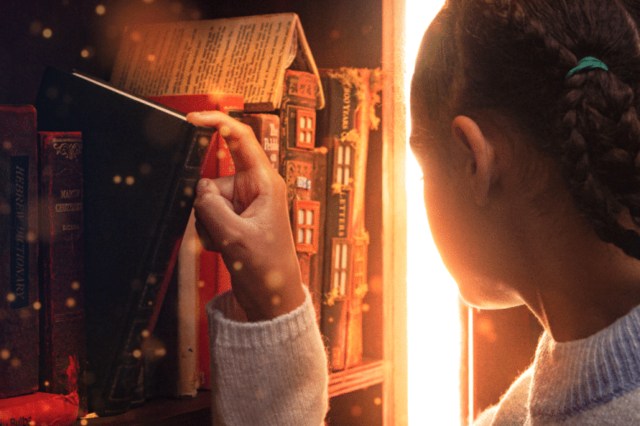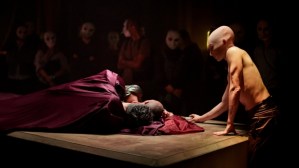Punchdrunk’s The Lost Lending Library at Edinburgh International Festival – review
The immersive company present a show designed for primary-age schoolchildren

It’s always hard to judge a show for children when you don’t actually have a child in tow. The Lost Lending Library, Punchdrunk’s contribution to the Edinburgh International Festival, firmly states that adults must be accompanied by a child. Exceptions were made for reviewers.
A small group of us, then, mainly children, are ushered into a corner of the bar of the Church Hill Theatre to be greeted by a librarian called Perry (Simon Maeder), a symphony in browns and earnestness, who introduces himself as an apprentice guardian in The Lost Lending Library, all 314 floors of it, which jumps from place to place “connecting with the best imaginations around the world.”
But when he sweeps aside the curtain that ostensibly leads us into this magical place, the door has vanished. That’s the beginning of a journey to find the library and understand the possibilities of imagination.
First, a tray of assorted objects – a snowstorm, a spaceship, a globe, a wellington boot – is brought out and the children are encouraged to build a story (setting, character, qualities, problem, resolution), then we search around a larger space for clues. Finally, we are ushered into a tiny room, where we sit and listen to another story and have our efforts gently rewarded. (With a library card!)
The show, written and directed by Mia Jerome and produced by Punchdrunk Enrichment (the educational arm of the immersive theatre company), reveals all the merits of their approach. The detail in Kate Rigby’s original design of the library, when we eventually enter what we are told is the Miscellaneous Section, is a joy. The meticulous set building has created a room where paper planes fly overhead, a little train runs through the crammed bookshelves, and inspirational photographs of figures such as Malala Yousafzai are pinned to the walls.
There are sinister rumbles from the sound system, and phones that are hidden within piles of books. There are mementoes of Italy, Mexico and a treasure trove of peals and precious jewels. Dusty labels, cobwebs and fascinating volumes abound.
But the disadvantages of the approach are on view too. There isn’t enough attention paid to the power of the narrative; the stories told are bland. And there is too much verbal emphasis on the fact that we are all capable of imagining the best stories of all. Being told it over and over again is no compensation for the fact that the structure – unusually for Punchdrunk – doesn’t allow time to explore the space on your own, or to let your thoughts really run riot in the minutiae of the wonderful world they have created.
Some of my younger companions seemed engrossed; others were clearly bored, perhaps willing to be more adventurous than the constraints imposed upon them. It’s a pleasant hour, but not a transformative one.
















